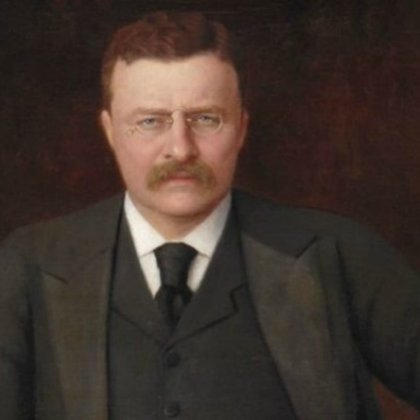THEODORE ROOSEVELT BECAME THE 26TH US PRESIDENT (1901-1909) AFTER THE ASSASSINATION OF PRESIDENT WILLIAM MCKINLEY.HE WAS ONE MOST DYNAMIC PRESIDENT IN WHITE HOUSE HISTORY.THEODORE ROOSEVELT WAS INTERESTED IN PROTECTING THE ENVIRONMENT BE ALLOCATED 200 MILLION ACRES TO BE PRESERVED AS NATIONAL FORESTS.
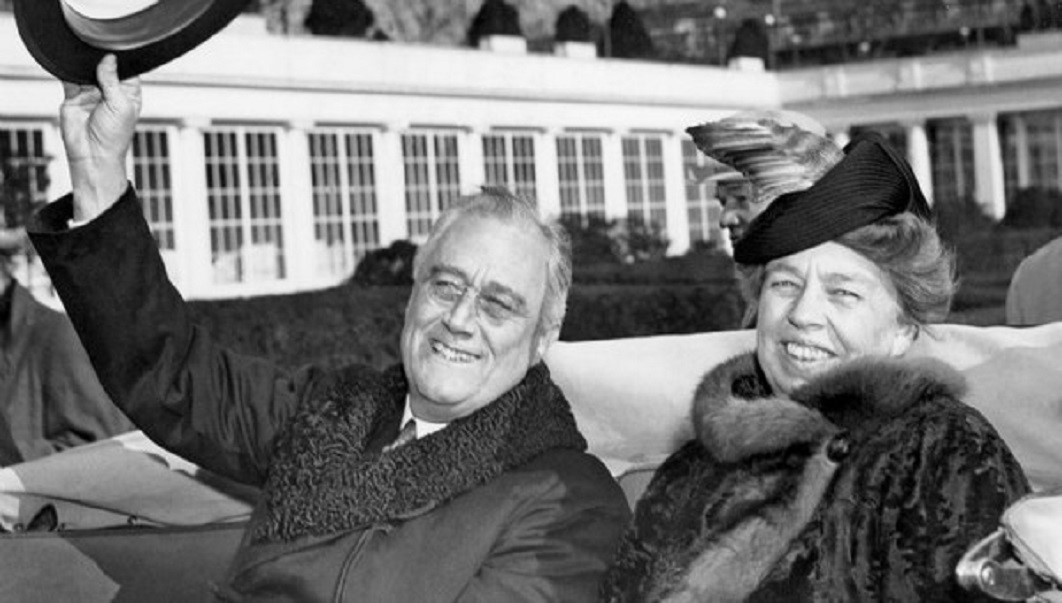 Eleanor and Franklin Roosevelt were not the first White House couple to
act as political partners, but they were the first to do so in such a
public fashion. Eleanor Roosevelt was a first lady of firsts. She was
the first president’s wife to fly in an airplane. She was the first to
testify before Congress. She was the first to hold a government job and
to address a national political convention. Franklin
Delano Roosevelt supported her public
activities, in part, because they benefited his own political ends.
Eleanor and Franklin Roosevelt were not the first White House couple to
act as political partners, but they were the first to do so in such a
public fashion. Eleanor Roosevelt was a first lady of firsts. She was
the first president’s wife to fly in an airplane. She was the first to
testify before Congress. She was the first to hold a government job and
to address a national political convention. Franklin
Delano Roosevelt supported her public
activities, in part, because they benefited his own political ends.
Theodore Teddy Roosevelt was the 26th President of the United States,born in New York City on Oct. 27, 1858. His father was of an old Dutch mercantile family long prominent in the city's affairs. His mother came from an established Georgia family of Scotch-Irish and Huguenot ancestry. A buoyant, dominant figure, his father was the only man, young Roosevelt once said, he "ever feared." He imbued his son with an acute sense of civic responsibility and an attitude of noblesse oblige.Before becoming the 26th President (1901–1909) he held offices at the municipal, state, and federal level of government.He is well remembered for his energetic persona, his range of interests and achievements, his model of masculinity, and his cowboy image. He was a leader of the Republican Party and founder of the short-lived Bull Moose Party. Roosevelts achievements as a naturalist, explorer, hunter, author, and soldier are as much a part of his fame as any office he held as a politician. Born to a wealthy family, Roosevelt was a sickly child who stayed at home studying natural history. In response to his physical weakness, he embraced a strenuous life.Partly because of a severe asthmatic condition, Theodore was educated by private tutors until 1876, when he entered Harvard College.A year out of Harvard, in 1881 he ran for a seat in the state legislature. His first historical book, The Naval War of 1812, published in 1882, established his reputation as a serious historian. After a few years of living in the Badlands, Roosevelt returned to New York City, where he gained fame for fighting police corruption. He was effectively running the US Department of the Navy when the Spanish American War broke out; he resigned and led a small regiment in Cuba known as the Rough Riders, earning himself the Medal of Honor. Abandoning plans to become a naturalist, he developed political and historical interests, was elected to Phi Beta Kappa, and finished twenty-first in a class of 158. Four months after his graduation in 1880.He married twice, his first wife was Alice Hathaway Lee and they married on October 27, 1880. Alice died 48 hours after their daughter was born and Theodore Roosevelt's mother died later on the same day!Theodore Roosevelt's second marriage was to Edith Kermit Carow on December 2, 1886. They had known each other since childhood and together they had five children.After the war, he returned to New York and was elected Governor, two years later he was nominated for and elected Vice President of the United States. In 1901, President William McKinley was assassinated, and Roosevelt became president at the age of 42, the youngest age of taking office of any U.S. President in history. Roosevelt understood better than most politicians the importance of sea power as a projection of a nation’s power and prestige. Sending the fleet around the world advised all nations, friendly and enemy to the US that the United States was a major actor on the international scene and was assuming its rightful place among the world powers. His advice to “Speak softly and carry a big stick” was evidenced by this operation.eddy showed off his diplomatic skills and earned respect and prestige for the US by mediating a treaty ending the Russo-Japanese War. Once again, this diplomacy demonstrated the importance of the place of the US among world powers.A strong nationalist and a resourceful leader, Theodore Roosevelt gloried in the opportunities and responsibilities of world power. He especially enlarged the United States role in the Far East and Latin America. At home he increased regulation of business, encouraged the labor movement, and waged a long, dramatic battle for conservation of national resources. He also organized the Progressive party (1912) and advanced the rise of the welfare state with a forceful campaign for social justice. Roosevelt coined the phrase Square Deal to describe his domestic agenda, emphasizing that the average citizen would get a fair shake under his policies.Roosevelt was the first president to travel outside of the continental United States while in office. In 1906, he traveled to Panama.In 1906, Roosevelt was awarded the Nobel Peace Prize for his role of negotiator in the Russo-Japanese War. He was the first American to win the Nobel Prize.
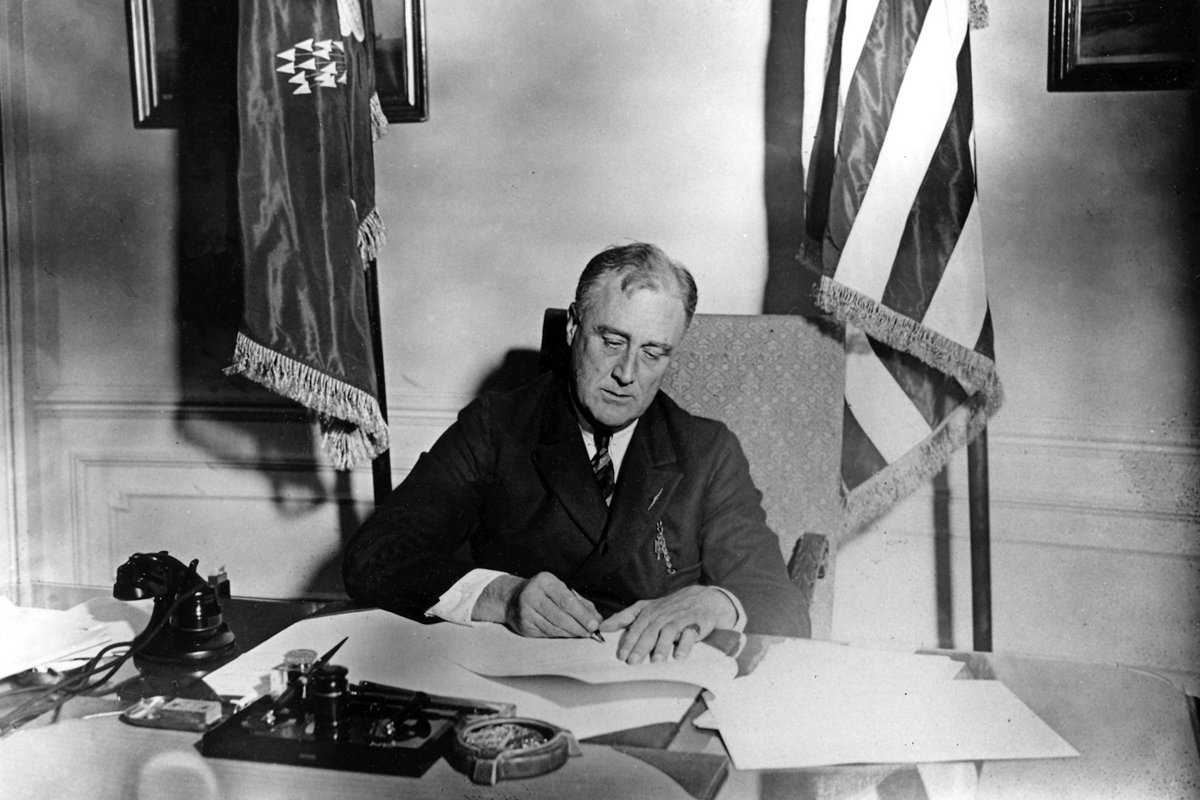 The idea of measuring an American president by the accomplishments of
his first 100 days in office goes back to 1933 and President Franklin
Delano Roosevelt's dash to staunch a banking crisis and pull America out
of the Great Depression."I think that we all wanted the opportunity of a little quiet thought to
examine and assimilate in a mental picture the crowding events of the
hundred days which had been devoted to the starting of the wheels of the
New Deal," Roosevelt said.
The idea of measuring an American president by the accomplishments of
his first 100 days in office goes back to 1933 and President Franklin
Delano Roosevelt's dash to staunch a banking crisis and pull America out
of the Great Depression."I think that we all wanted the opportunity of a little quiet thought to
examine and assimilate in a mental picture the crowding events of the
hundred days which had been devoted to the starting of the wheels of the
New Deal," Roosevelt said.
Roosevelt returned to New York City in 1895 to serve two tumultuous years as president of the police board. Enforcing the law with relentless efficiency and uncompromising honesty, he indulged once more in acrimonious controversy with the leaders of his party. He succeeded in modernizing the force, eliminating graft from the promotion system, and raising morale to unprecedented heights. "It's tough on the force, for he was dead square … and we needed him," said an unnamed policeman when Roosevelt resigned in the spring of 1897 to become President William McKinley's assistant secretary of the Navy.As assistant secretary, Roosevelt instituted personnel reforms, arranged meaningful maneuvers for the fleet, and lobbied energetically for a two-ocean navy. He uncritically accepted imperialistic theories, and he worked closely with senators Henry Cabot Lodge and Alfred Beveridge for war against Spain in 1898. By deferring to the Republican machine on minor matters, by mobilizing public opinion behind his program, and by otherwise invoking the arts of the master politician, Roosevelt forced an impressive body of legislation through a recalcitrant Assembly and Senate. Most significant, perhaps, was a franchise tax on corporations. As the Democratic New York World concluded when he left office, "the controlling purpose and general course of his administration have been high and good."Roosevelt accepted the vice-presidential nomination in 1900. A landslide victory for McKinley and Roosevelt ensued. Then, on Sept. 14, 1901, following McKinley's death by an assassin's bullet, Roosevelt was sworn in. Not quite 43, he was the youngest president in history.Roosevelt's first three years in office were inhibited by the conservatism of Republican congressional leaders and the accidental nature of his coming to power. He was able to sign the Newlands Reclamation Bill into law (1902) and the Elkins Antirebate Bill (1903), he also persuaded Congress to create a toothless Bureau of Corporations. But it was his sensational use of the dormant powers of his office that lifted his first partial term above the ordinary.On Feb. 18, 1902, Roosevelt shook the financial community and took a first step toward bringing big business under Federal control by ordering antitrust proceedings against the Northern Securities Company, a railroad combine formed by J. P. Morgan and other magnates. Suits against the meat-packers and other trusts followed, and by the time Roosevelt left office 43 actions had been instituted. Yet he never regarded antitrust suits as a full solution to the corporation problem. During his second administration he strove, with limited success, to provide for continuous regulation rather than the dissolution of big businesses.Hardly less dramatic than his attack on the Northern Securities Company was Roosevelt's intervention in a five-month-long anthracite coal strike in 1902. By virtually forcing the operators to submit to arbitration, he won important gains for the striking miners. Never before had a president used his powers in a strike on labor's side.The Presidential election campaign of November 1932 took place against the backdrop of the most severe economic depression in American history. While Republican President Herbert Hoover was personally blamed for failing to deal with the consequences of the Wall Street Crash of October 1929, the Democratic candidate, Franklin D Roosevelt promised.A new deal for the American people.Following a landslide election victory, Roosevelt faced the enormous task of restoring confidence in a shattered economy. At first glance, Roosevelt's privileged background might have made it difficult for him to understand the problems faced by those who were unemployed or poverty stricken. However, in 1921 an attack of polio had left Roosevelt permanently crippled, and his ongoing battle against this terrible illness enhanced his ability to relate to ordinary Americans.The Republican candidates for President and Vice President, Governor Alfred M. Landon of Kansas and Colonel Frank Knox of Illinois, are the worst-beaten aspirants for these offices in the political annals of the United States, with the exception of William H. Taft in 1912, when Colonel Theodore Roosevelt led a formidable revolt in the Republican party and Mr. Taft carried only Vermont and Utah. Utah was also in the President's campaign bag. He had carried forty-five States as contrasted with the forty- two he won from Herbert Hoover in 1932. And to assure his reputation as the greatest vote-getter in the annals of the United States he--a Democrat--had overwhelmingly swept Pennsylvania, unfailingly Republican for generations in national elections.As he entered the White House, the scale of the problem he faced was immense. By the winter of 1932-1933, the country seemed to have reached rock bottom. Roosevelt's personal solution, the New Deal was the largest, most expensive government programme in the history of the American presidency. However, historians do not necessarily agree as to whether the New Deal was a success or a failure.The President's managers, alarmed by the rise in Republican hopes and activities and by news that such States as Massachusetts, New York and Illinois were too close for comfort, prevailed on Mr. Roosevelt greatly to extend his speaking schedule, with the result that he almost duplicated his effort of 1932.Several factors in addition to control of the executive branch of the government and Congress were in the balance as the voters went to the polls yesterday. The next President will in all likelihood have several appointments to make for justices of the Supreme Court. The party leadership will almost inevitably shift back to this side of the Mississippi River and Chairman John D. M. Hamilton will have to make way for another. Also, Mr. Landon will not be renominated, and the star of Senator Arthur H. Vandenberg of Michigan will rise for 1940.
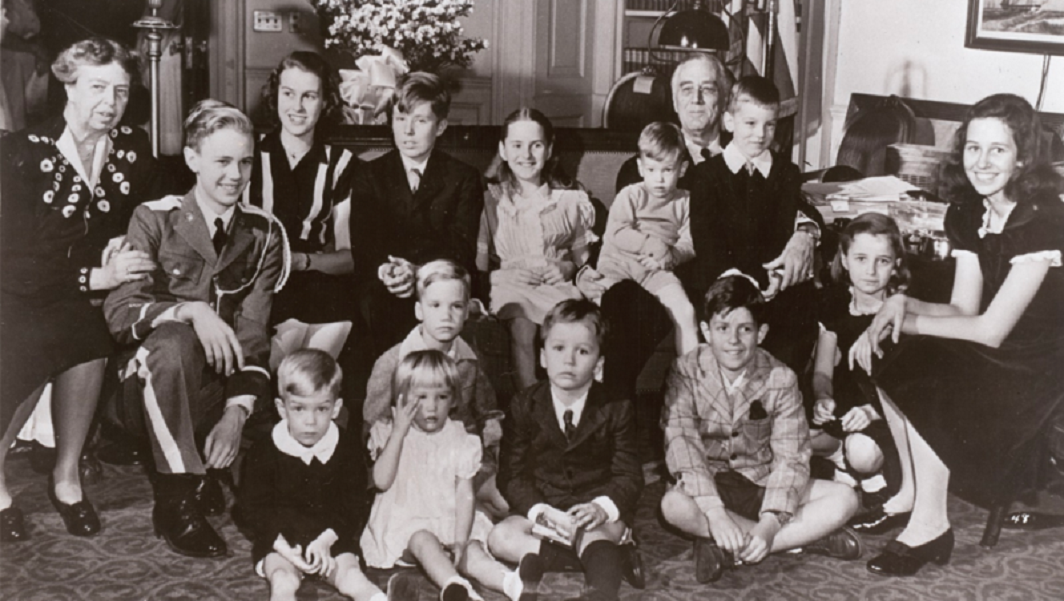 Franklin and Eleanor Roosevelt pose with their 13 grandchildren at the
White House on January 20, 1945. In total the Roosevelts had over 20
grandchildren, including several who were born after the President’s
death in 1945.t l-r Christopher R., Ann R., John Boettiger, Elliott R, Jr., Sara R.;
2nd row - Curtis R., Haven R., Kate R.; last row Anna Boettiger, William
R., Ruth R.
Franklin and Eleanor Roosevelt pose with their 13 grandchildren at the
White House on January 20, 1945. In total the Roosevelts had over 20
grandchildren, including several who were born after the President’s
death in 1945.t l-r Christopher R., Ann R., John Boettiger, Elliott R, Jr., Sara R.;
2nd row - Curtis R., Haven R., Kate R.; last row Anna Boettiger, William
R., Ruth R.
America enters World War I two years earlier.Teddy Roosevelt could never sit by and watch a fight: he either had to break it up or join in. So when the old Rough Rider hears, in 1914, that Germany has marched over neutral Belgium to attack France, he commits our resources, and then our soldiers, to the Allied cause.Roosevelt's conduct of foreign policy was as dynamic and considerably more far-reaching in import. Believing that there could be no retreat from the power position which the Spanish-American War had dramatized but which the United States industrialism had forged, he stamped his imprint upon American policy with unusual force. At the instance of the president of Santo Domingo, Roosevelt also arranged for the United States to assume control of the customs of that misgoverned nation in order to avert intervention by European powers. He had about the same desire to annex Santo Domingo, he said, "as a gorged boa constrictor might have to swallow a porcupine wrong-end-to." But he had already forestalled German intervention in Venezuela in 1902 and was anxious to establish a firm policy against it. So on May 20, 1904, and again in December he set forth what became known as the Roosevelt Corollary to the Monroe Doctrine. The United States, he declared, assumed the right to intervene in the internal affairs of the Latin American nations in the event of "chronic wrongdoing" or "impotence."Roosevelt's first administration was also marked by a revitalization of the bureaucracy. The quality of appointees was raised, capable members of minority groups were given government posts (in 1906 Roosevelt named the first Jew, Oscar Straus, to a Cabinet position), and the civil service lists were expanded. At the same time, however, the President ruthlessly manipulated patronage so as to wrest control of Republican party machinery from Senator Mark Hanna and secure his nomination to a full term in 1904. "In politics," he disarmingly explained, "we have to do a great many things we ought not to do." Overwhelming his conservative Democratic opponent by the greatest popular majority to that time, Roosevelt won the election and carried in a great host of congressional candidates on his coattails.Within 3 months of the outbreak of war in Europe in 1914, Roosevelt began his last crusade: an impassioned campaign to persuade the American people to join the Allies and prosecute the war with vigor. He believed that a German victory would be inimical to American economic, political, and cultural interests. But he was also influenced, as in 1898, by his romantic conception of war and ultranationalism. As a result, he distorted the real nature of his thought by trumpeting for war on the submarine, or American-rights, issue alone. More regrettable still, he virtually called for war against Mexico in 1916.Following America's declaration of war in April 1917, Roosevelt relentlessly attacked the administration for failing to mobilize fast enough. Embittered by Wilson's refusal to let him raise a division, he also attacked the President personally. He was unenthusiastic about the League of Nations, believing that a military alliance of France, Great Britain, and the United States could best preserve peace. He was prepared to support Senator Henry Cabot Lodge's nationalistic reservations to the League Covenant, but he died in his home at Oyster Bay, Long Island, on Jan. 6, 1919, before he could be effective.Roosevelt's reputation as a domestic reformer remains high and secure. He was the first president to concern himself with the judiciary's massive bias toward property rights (as opposed to human rights), with the maldistribution of wealth, and with the subversion of the democratic process by spokesmen of economic interests in Congress, the pulpits, and the editorial offices. He was also the first to understand the conservation problem in its multiple facets, the first to evolve a regulatory program for capital, and the first to encourage the growth of labor unions. The best-liked man of his times, he has never been revered because his militarism and chauvinism affronted the human spirit.Since the war ends almost two years earlier, Roosevelt is able to talk the Allies into seeking reasonable reparation costs from the Germans and their allies, the Austrians. Before he dies in office in 1918, he has convinced England, France, and Italy to a continental plan similar to that created for France after Napoleon’s defeat. Having exiled its Kaiser and become a Republic, Germany is invited to rejoin the European nations. For the next 30 years, the Congress of Paris ensures the status quo between nations and suppresses any talk of revolution or nationalism.All these benefits wouldn’t have accrued without some problems. According to one way of looking at history, if Communism didn’t get a strong foothold in Russia, it would have done so in Germany. Japan would still have emerged as a world power and very likely would still have invaded China. If successful, Japan and the US would have very likely found themselves in conflict over control of the Pacific.Very probably, the atom bomb would have still been developed. Given human nature, it’s very likely one country or another would have had the curiosity to use it. Although the Russian army suffers a paralyzing defeat on the Eastern Front, it is mostly intact when the war ends and the troops march home. The German government is too busy saving itself in 1917 to send the exiled Lenin back into Russia. Without their charismatic leader, the Bolsheviks of Moscow make little progress stirring up revolution. Russian veterans happily round up the loudest revolutionaries and ship them off to Siberia. By November, when the Bolsheviks would have seized the government, they have disappeared underground.Roosevelt's pronounced impact on the international scene continued during his second term. He intervened decisively for peace in the Algeciras crisis of 1905-1906, and he supported the call for the Second Hague Conference of 1907. But it was in the Far East, where he gradually abandoned the imperialistic aspirations of his pre-presidential years, that he played the most significant role. Perceiving that Japan was destined to become a major Far Eastern power, he encouraged that country to serve as a stabilizing force in the area. To this end he used his good offices to close the Russo-Japanese War through a conference at Portsmouth, N.H., in 1905; for this service he received the Nobel Peace Prize. He also acquiesced at this time in Japan's extension of suzerainty over Korea .By 1907 Roosevelt realized that the Philippines were the United States' "heel of Achilles." He had also come to realize that the China trade which the open-door policy was designed to foster was largely illusory. He consequently labored to maintain Japan's friendship without compromising American interests. He fostered a "gentleman's agreement" on immigration of Japanese to the United States. He implicitly recognized Japan's economic ascendancy in Manchuria through the Root-Takahira agreement of 1908.In 1945, President Franklin D. Roosevelt died of a massive cerebral hemorrhage at his Warm Springs, Georgia, retreat at the age of 63. Roosevelt’s death in the final months of World War II was met with shock and grief throughout the Western world. Many Americans had no inkling of his decline in health.
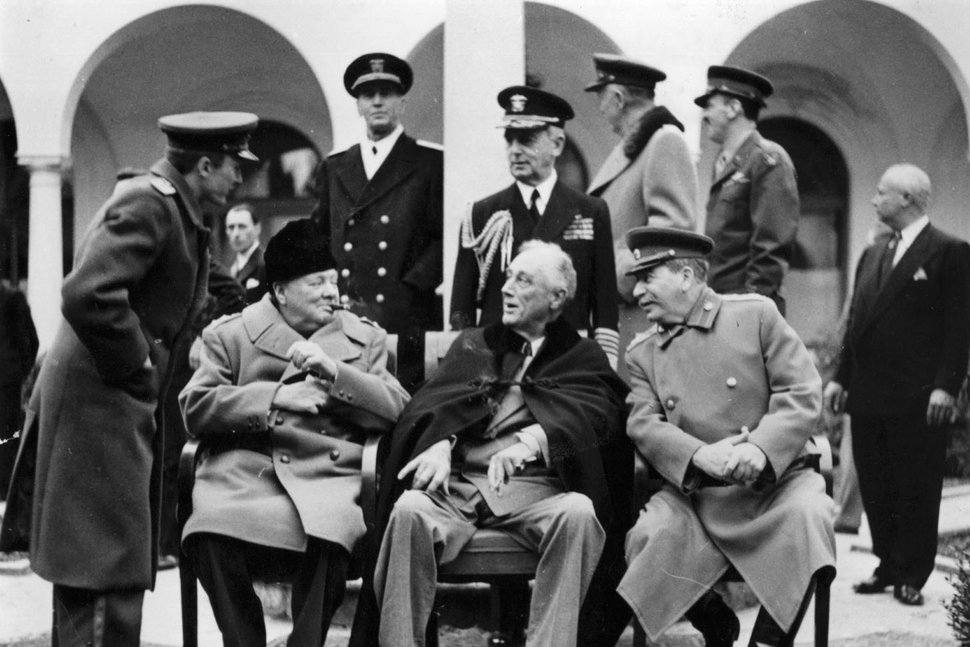 British
wartime Prime Minister Sir Winston Leonard Spencer Churchill, left,
U.S. President Franklin Delano Roosevelt, center, and Soviet leader
Joseph Stalin sit in the grounds of the Livadia Palace, Yalta, during
the Three Power Conference in February 1945.They meet to discuss the Allied war effort against Germany and Japan and to try and settle some nagging diplomatic issues. While a number of important agreements were reached at the conference, tensions over European issues particularly the fate of Poland foreshadowed the crumbling of the Grand Alliance that had developed between the United States, Great Britain, and the Soviet Union during World War II and hinted at the Cold War to come.
British
wartime Prime Minister Sir Winston Leonard Spencer Churchill, left,
U.S. President Franklin Delano Roosevelt, center, and Soviet leader
Joseph Stalin sit in the grounds of the Livadia Palace, Yalta, during
the Three Power Conference in February 1945.They meet to discuss the Allied war effort against Germany and Japan and to try and settle some nagging diplomatic issues. While a number of important agreements were reached at the conference, tensions over European issues particularly the fate of Poland foreshadowed the crumbling of the Grand Alliance that had developed between the United States, Great Britain, and the Soviet Union during World War II and hinted at the Cold War to come.
